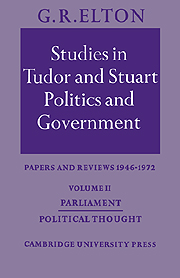Book contents
- Frontmatter
- Contents
- Acknowledgments
- Abbreviations
- III PARLIAMENT
- 21 Studying the History of Parliament
- 22 ‘The Body of the Whole Realm’: Parliament and Representation in Medieval and Tudor England
- 23 Parliamentary Drafts 1529–1540
- 24 The Evolution of a Reformation Statute
- 25 The Commons' Supplication of 1532: Parliamentary Manoeuvres in the Reign of Henry VIII
- 26 An Early Tudor Poor Law
- 27 The Stuart Century
- 28 A High Road to Civil War?
- 29 The Unexplained Revolution
- IV POLITICAL THOUGHT
- General Index
- Index of Authors Cited
22 - ‘The Body of the Whole Realm’: Parliament and Representation in Medieval and Tudor England
Published online by Cambridge University Press: 23 December 2009
- Frontmatter
- Contents
- Acknowledgments
- Abbreviations
- III PARLIAMENT
- 21 Studying the History of Parliament
- 22 ‘The Body of the Whole Realm’: Parliament and Representation in Medieval and Tudor England
- 23 Parliamentary Drafts 1529–1540
- 24 The Evolution of a Reformation Statute
- 25 The Commons' Supplication of 1532: Parliamentary Manoeuvres in the Reign of Henry VIII
- 26 An Early Tudor Poor Law
- 27 The Stuart Century
- 28 A High Road to Civil War?
- 29 The Unexplained Revolution
- IV POLITICAL THOUGHT
- General Index
- Index of Authors Cited
Summary
ORIGINS OF PARLIAMENT
When the first assembly of the colony of Virginia met in 1619, it inherited the achievements of a very ancient tradition. Indeed, the whole history of representative institutions in the New World since that date covers only about the same length of time as that which separates 1619 from the beginnings of the English Parliament. Ever since the middle of the thirteenth century, kings of England had called various gatherings of nobles and sometimes of commons to meet in conclave, to debate the affairs of the realm, and to assist in the tasks of government; in those 350 years just about every conceivable parliamentary event had occurred. The one inconceivable event lay in the not very distant future. So far, no Parliament of England had tried to govern without the king, though when from 1642 it came to do so, it was in turn to set an example which the young daughter assembly in Virginia was in time to find useful.
In 1619, however, if any of those who assembled at Jamestown had kept in touch with affairs in the mother country, they might have had some doubts about the future of the model which they were copying. There had then been no effective meeting of the English Parliament for nine years, easily the longest break in the history of the institution. That last session of 1610 had left a great many unresolved conflicts behind, and the one attempt since at a Parliament, in 1614, had produced total deadlock, with not one achievement to the credit of king, Lords, or Commons.
- Type
- Chapter
- Information
- Studies in Tudor and Stuart Politics and GovernmentPapers and Reviews 1946–1972, pp. 19 - 61Publisher: Cambridge University PressPrint publication year: 1974
- 2
- Cited by



